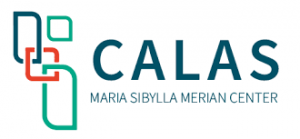CALAS/HIAS fellowship in Germany
Pathways of socioecological transformation in Latin America

The Maria Sibylla Merian Center for Advanced Latin American Studies in the Humanities and Social Sciences (CALAS) and the Hamburg Institute for Advanced Study (HIAS) call for outstanding scholars from Latin America and the Caribbean to carry out their research projects for four (4) months in Hamburg and two (2) months at the University of Kassel, Germany.
This year’s call focuses on the various pathways of socioecological transformation in Latin America. The region still faces significant challenges in this regard. Domestically, Latin America and the Caribbean continue to struggle with deeply rooted social inequalities, recurring economic crises and growing political instability, crises of social reproduction and growing informality of gendered labour as well as various forms and levels of authoritarianism. Right-wing extremism and populism exploit public dissatisfaction, fostering cultures and movements of rejection and resistance to progressive change. These dynamics pose serious obstacles to an ecological and inclusive transition toward a sustainable future.
On the international level, the region confronts an increasingly restrictive global environment, particularly in accessing modern `green´ technologies essential for its energy transition. Trade restrictions, intellectual property barriers, and geopolitical power struggles limit the region’s ability to develop sustainable solutions. At the same time, there is a growing risk that Latin America will once again become locked into a role as a mere supplier of raw materials—this time focusing on green energy and critical minerals vital for the global energy transition. These domestic and international factors shape the region’s diverse pathways of socioecological transformation, simultaneously creating both opportunities and challenges.
The fellowship aims to analyze the cultural, historical, political, economic, and technological prerequisites and consequences of socioecological transformation in Latin America and the Caribbean from an interdisciplinary perspective.
The proposed research should intersect at least two of the following dimensions:
- Cultural conditions of socioecological transformation: Cultural dynamics fundamentally shape socioecological transformation by influencing institutions, values, and behaviors. Deeply ingrained economic and social models—such as carbon-intensive lifestyles and notions of prosperity—affect the adoption of sustainable alternatives. Additionally, gendered power structures tied to extractivist economies often reinforce resistance to change. However, organizational cultures that promote collaboration and transparency can drive systemic shifts, supported by strong institutional networks that facilitate knowledge exchange. Artistic and literary expressions as well as discourse and semantic battles contribute to reshaping environmental narratives, while market forces and regulatory frameworks, when aligned with sustainability, enable transformation. Recognizing these interconnected factors is essential for conceptualizing inclusive and context-specific strategies that foster resilient and sustainable futures.
- Political and economic prerequisites and consequences: Socioecological transformation is deeply intertwined with existing inequalities, power structures, and economic models. The distribution of costs and benefits within society influences political coalitions and policy decisions, shaping the level of support for green transitions. The shift towards sustainable economies also affects labor markets, social reproduction, investment patterns, and fiscal policies, creating both opportunities for equitable development and risks of exacerbating disparities. Additionally, global economic dynamics—including trade policies, financial flows, and access to green technologies—further condition Latin America’s ability to navigate a just and sustainable transformation.
- Technological preferences: The choice of technologies for socioecological transformation has profound implications for domestic development. Some technologies foster local innovation and economic diversification, while others deepen dependency on foreign patents, supply chains, and expertise. The technological gap between Latin America and leading industrial nations raises critical questions about the feasibility of an autonomous green transition. Policy frameworks that promote domestic research and development, facilitate technology transfer, and regulate intellectual property rights play a decisive role in reducing vulnerabilities and ensuring that technological transitions contribute to sustainable and inclusive growth.
GENERAL CONDITIONS OF THE FELLOWSHIP
The Fellow is offered excellent conditions in an inspiring academic and artistic environment. There are numerous opportunities for cross-disciplinary and intersectional collaborations among fellows, researchers, and artists from HIAS member institutions in Hamburg and the CALAS/CELA network in Kassel.
Eligible candidates include researchers from all disciplines and career stages from the postdoctoral level onward, as well as outstanding artists and cultural professionals from all Latin American and Caribbean countries. Disciplines range from political economy, social sciences, and humanities to languages and the arts.
Applicants should have international visibility in their respective fields, along with demonstrated creativity and originality. They must have relevant publications related to the topic of the call and their proposed project. Additionally, the fellow is expected to actively participate in a dynamic community of scholars, scientists, artists and cultural professionals by contributing to conferences and public events. A strong command of written and spoken English and Spanish is essential.
The CALAS/HIAS fellowship offers a competitively remunerated scholarship for a stay of four months at HIAS in Hamburg (February to May 2026) and two months at the University of Kassel (June and July 2026). This grant includes a monthly stipend, the costs of visa, accommodation, health insurance, work materials, and other expenses. If an applicant has a permanent position, the grant can be used to finance a temporary teaching replacement. Additionally, the fellowship will cover the costs of the airfare to and from Germany.
The fellow is expected to reside at the respective CALAS or HIAS site for the whole duration of the fellowship and to participate in the activities and events organized by the respective institution.
During the stay, HIAS and the University of Kassel will provide the Visiting Fellow with a workplace with internet access, as well as the infrastructure of the university (library, etc.). Additionally, they will receive support in finding accommodation, completing bureaucratic formalities on site, obtaining the required visa, etc.
CALAS/HIAS are committed to inclusion and the goal of gender parity. Applications from academics with special needs are expressly welcome. CALAS/HIAS also welcomes the family and children accompanying the fellow during his/her stay.
Planned tasks for the CALAS/HIAS fellowship in Hamburg and Kassel
- Develop a research project aligned with the fellowship’s call, intersecting at least two of its thematic dimensions.
- Publish the research findings in one or more scientific articles.
- Teach a two-month concentrated course at the undergraduate or master's level in Social Sciences at the University of Kassel (in German or English).
- Conduct at least one public academic activity (lecture or conference) at each host institution during the fellowship period.
- Prepare a final 5-pages report summarizing all activities carried out during the tenure of the fellowship.
Application Process
Complete the online application form and add the following documents in English as pdf files:
- Motivation Letter explaining how the project fits into the CALAS/HIAS fellowship and what your expectations are.
- Two-page Curriculum Vitae with a list of relevant publications and courses taught in English and/or German.
- Summary of the research project, including a timeline and work plan, with a maximum of 20 bibliographic sources (max. 2,000 words). The proposed project establishes new perspectives/ways of thinking and shows potential for connections with other disciplines.
- Tandem Partner in Hamburg: Provide name of one or more possible academic cooperation partners from one of the HIAS member organizations (https://hias-hamburg.de/en/about-us/members/).
- Interdisciplinary course for Kassel: (max. 1 page with title and a brief course description -200 words) to be taught at Kassel University (English or German).
- Degree certificates: Copy of most recent academic degree certificates.
Key Dates
- Application deadline: 31 May 2025
- Selection results: 1 July 2025
- Fellowship start date: February-May 2026 (Hamburg) – June-July 2026 (Kassel)
Further information on the CALAS/HIAS fellowship:
For further inquiries, please use the following address: uk106991@uni-kassel.de

